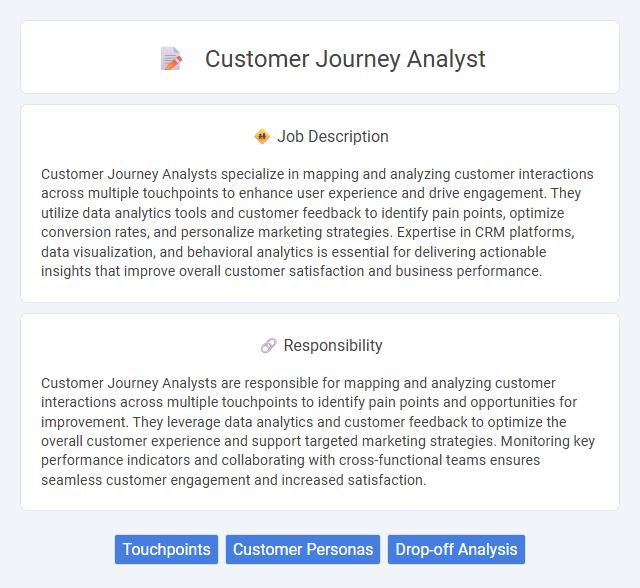
Customer Journey Analysts specialize in mapping and analyzing customer interactions across multiple touchpoints to enhance user experience and drive engagement. They utilize data analytics tools and customer feedback to identify pain points, optimize conversion rates, and personalize marketing strategies. Expertise in CRM platforms, data visualization, and behavioral analytics is essential for delivering actionable insights that improve overall customer satisfaction and business performance.
Individuals who possess strong analytical skills and a keen interest in understanding consumer behavior are likely to be well-suited for a Customer Journey Analyst role. Those comfortable working with data, extracting insights, and mapping customer interactions across various touchpoints may find this position aligns with their strengths. Conversely, people who struggle with detail-oriented tasks or lack curiosity about user experiences might find the job challenging.
Qualification
Customer Journey Analysts require strong analytical skills, proficiency in data analysis tools such as SQL, Google Analytics, and Tableau, and a deep understanding of customer behavior and segmentation. Expertise in mapping customer touchpoints, interpreting qualitative and quantitative data, and generating actionable insights to improve user experience is essential. Experience in marketing analytics, customer experience management, and effective communication skills to collaborate with cross-functional teams strengthen qualifications in this role.
Responsibility
Customer Journey Analysts are responsible for mapping and analyzing customer interactions across multiple touchpoints to identify pain points and opportunities for improvement. They leverage data analytics and customer feedback to optimize the overall customer experience and support targeted marketing strategies. Monitoring key performance indicators and collaborating with cross-functional teams ensures seamless customer engagement and increased satisfaction.
Benefit
A Customer Journey Analyst is likely to enhance a company's insight into consumer behavior, improving targeted marketing strategies and boosting customer engagement. This role may lead to more personalized customer experiences, potentially increasing satisfaction and loyalty. Businesses employing a Customer Journey Analyst often experience better allocation of resources and higher conversion rates.
Challenge
A Customer Journey Analyst likely faces the challenge of accurately mapping complex, multi-channel customer interactions to provide actionable insights. The role probably requires navigating large datasets and integrating qualitative feedback to identify pain points and opportunities. Adapting to rapidly evolving customer behaviors and technologies may add further complexity to their analysis efforts.
Career Advancement
Customer Journey Analysts who excel in data analysis, customer behavior mapping, and multi-channel optimization often advance to senior roles such as Customer Experience Manager or Head of Customer Insights. Mastery of tools like Google Analytics, Qualtrics, and CRM software enhances opportunities for leadership positions in marketing and product strategy. Progressive career growth depends on strong skills in data-driven decision-making, cross-functional collaboration, and strategic planning within customer experience teams.
Key Terms
Touchpoints
Customer Journey Analysts specialize in identifying, mapping, and optimizing key customer touchpoints across digital and physical channels to enhance user experience and drive engagement. They analyze data from interactions such as website visits, social media engagement, call centers, and in-store visits to uncover pain points and opportunities for improvement. Their insights enable businesses to deliver personalized experiences that increase customer satisfaction and retention.
Customer Personas
A Customer Journey Analyst specializing in Customer Personas leverages data to create detailed profiles that represent target audience segments, enabling personalized marketing strategies and enhanced user experiences. They analyze behavioral patterns, preferences, and pain points across touchpoints to optimize customer interactions and increase conversion rates. Mastery in tools like CRM software, analytics platforms, and segmentation techniques is essential to deliver actionable insights driving customer-centric decision-making.
Drop-off Analysis
A Customer Journey Analyst specializing in drop-off analysis uses behavioral data and analytics tools to identify key points where customers abandon the conversion funnel. This role involves segmenting user pathways, interpreting clickstream data, and applying predictive models to uncover friction points that hinder customer progression. Insights from drop-off patterns enable targeted optimizations, improving retention rates and maximizing overall customer lifetime value.
 kuljobs.com
kuljobs.com